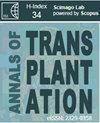生活在波兰的穆斯林赞成器官移植吗?
IF 1.1
4区 医学
Q3 SURGERY
引用次数: 0
摘要
虽然国际伊斯兰法律研究学会和伊斯兰医学科学组织已正式批准移植,但穆斯林在这个问题上的意见并不统一。本研究的目的是评估居住在波兰东北部的穆斯林鞑靼人对器官移植的一般知识、态度和意见。材料/方法本研究包括78名穆斯林鞑靼人,在穆斯林文化中心采用诊断民意调查法进行。结果接受活体供体移植的比例为96.1%,接受死亡供体移植的比例为88.8%。近亲属死亡后同意摘取器官的比例为57.7%,反对的比例为1/5。70.5%的应答者赞成死后摘取器官,受过高等教育和职业教育的人比只受过初等教育的人更多。只有2.2%的回应者向中央反对意见登记册提出反对意见。近40%的男性和女性告知家人他们愿意成为器官捐赠者。大多数(71.8%)受访者对移植持肯定态度,25.6%的人持否定态度,2.6%的人持中立态度。约72%的受访者认为从死亡捐赠者身上摘取器官的最终决定权应由家属决定,8.9%的受访者认为应由法律规定。结论:居住在波兰的穆斯林鞑靼人大多接受从活体捐献者和尸体上摘取器官。性别和教育程度对有关器官捐赠的决定有相当大的影响。本文章由计算机程序翻译,如有差异,请以英文原文为准。
Do Muslims Living in Poland Approve of Organ Transplantation?
Background Although the International Society for Islamic Legal Studies and the Islamic Organization for Medical Sciences have officially approved of transplantations, Muslims’ opinions on this issue are not uniform. The aim of this study was to assess the general knowledge, attitudes, and opinions concerning organ transplantation among Muslim Tatars living in North-East Poland. Material/Methods The study included 78 Muslim Tatars and was carried out at the Center of Muslim Culture using the diagnostic poll method. Results Transplantation from living donors was accepted by 96.1% of respondents, and from dead donors by 88.8% of respondents. Consent to the removal of organs after the death of a close relative was approved of by 57.7%, and 1/5 of respondents objected to it. Removal of their organs after death was approved of by 70.5% of respondents, more often by persons with higher education and vocational education than among those with only elementary education. Only 2.2% of respondents had reported their objection to the Central Objection Register. Almost 40% of men and women informed their family members about their willingness to be an organ donor. Most (71.8%) respondents had a positive attitude to transplantation, 25.6% had a negative attitude, and 2.6% were neutral. Approximately 72% of respondents believed that the final decision concerning the removal of organs from dead donors should be made by the family, and according to 8.9%, it should be prescribed by the law. Conclusions Muslim Tatars living in Poland mostly accept the removal of organs both from live donors and from dead bodies. Gender and education level had a considerable impact on the decision concerning organ donation.
求助全文
通过发布文献求助,成功后即可免费获取论文全文。
去求助
来源期刊
CiteScore
2.50
自引率
0.00%
发文量
79
审稿时长
>12 weeks
期刊介绍:
Annals of Transplantation is one of the fast-developing journals open to all scientists and fields of transplant medicine and related research. The journal is published quarterly and provides extensive coverage of the most important advances in transplantation.
Using an electronic on-line submission and peer review tracking system, Annals of Transplantation is committed to rapid review and publication. The average time to first decision is around 3-4 weeks. Time to publication of accepted manuscripts continues to be shortened, with the Editorial team committed to a goal of 3 months from acceptance to publication.
Expert reseachers and clinicians from around the world contribute original Articles, Review Papers, Case Reports and Special Reports in every pertinent specialty, providing a lot of arguments for discussion of exciting developments and controversies in the field.

 求助内容:
求助内容: 应助结果提醒方式:
应助结果提醒方式:


